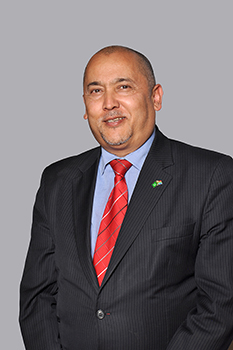Latest News Archive
Please select Category, Year, and then Month to display items
10 March 2022
|
Story Anthony Mthembu
|
Photo Unsplash
 The No Student Hungry team gearing up to start distributing food parcels to the selected students.
The No Student Hungry team gearing up to start distributing food parcels to the selected students.
The UFS is one of the many institutions of higher learning where food insecurity is an active issue. However, the
No Student Hungry Programme is one of the initiatives launched at the university to assist in fighting food insecurity at the institution.
The purpose of the programme
Since its inception in 2011, the initiative has assisted many students in acquiring a healthy meal. Additionally, the Food Environment Office also hands out food packages, so that students can continue to achieve academically. “We are trying to develop a healthy environment for students and make it easier for them to have a nice and healthy meal,” stated Annelize Visagie, who heads the Food Environment Office at the UFS. The Food Environment programme is spread out on all three campuses, each with its own facilitators. Furthermore, the programme mainly caters for students who are not funded by the National Student Financial Aid Scheme (NSFAS) but who are excelling academically. The abovementioned students apply for assistance online, and a list is then drawn up of students who receive assistance for the year.
Alternative solutions to keep the initiative running
On the Bloemfontein Campus, the No Student Hungry Programme will be catering for 200 students in the 2022 academic year, assisting them with a daily nutritious meal. Additional food parcels are also handed out to provide further assistance. “We give food parcels to the students on the list every Tuesday and Thursday at the Thakaneng Bridge,” Visagie highlighted. However, she argues that catering for the student population through this programme can be a challenge, as the demand for assistance is growing rapidly and the ability to assist is limited. The programme relies on partnerships and sponsors to assist the student body. In fact, the coordinators of the programme currently have a memorandum of understanding with Tiger Brands according to which they deliver around 100 food parcels for distribution.
In addition, the coordinators have put in place alternative measures to ensure that they can provide more food to students. “The
Kovsie Act Office, in partnership with the
Department of Sustainable Food Systems and Development, has started a food garden where healthy and nutritious produce are grown, in order to add value to the distribution,” she indicated. Although the programme can only assist to a point, students who are in desperate need of assistance are never turned away. In fact, the
Social Support Unit at Thakaneng Bridge usually assists students with food vouchers for a maximum of four days.
A commitment to teaching healthy eating habits
The programme is not only committed to curbing food insecurity, but also to ensuring that students have a healthy and balanced diet. As such, a booklet is being issued by the
Department of Nutrition and Dietetics in collaboration with the Department of Sustainable Food Systems and Development, which contains ways in which students can make a healthy meal using some of the ingredients offered in the food parcels.
“We want to teach students how to eat healthy in the cheapest way, because they don’t have a lot of money to buy expensive food products,” Visagie argued.
Meet our Councillor Ryland Fisher - media expert, political commentator, art lover
2016-07-13

Ryland Fisher
Photo: Johan Roux
With more than 30 years’ experience in the media industry as former editor of the Cape Times and New Age, as well as assistant editor of the Sunday Times, and thanks to a profound understanding of the political situation in South Africa, Ryland Fisher was an obvious choice to serve on the Council of the University of the Free State.
Racial issues and diversity
He was born and bred in Cape Town, and studied Journalism at Rhodes University before the political situation in South Africa interrupted his studies. Despite this, Ryland has made a deep impression on the academy. Among others, he presented lectures on racial issues and diversity at the University of Cape Town, the Institute for the Advancement of Journalism in Johannesburg, Emory University in Atlanta, and Ohio University.
Author and editor
Ryland has published two books, Race in 2007 and Making the Media Work for You in 2002, and was editor of the Official Opus on Nelson Mandela.
He was elected to the UFS Council in 2015. Ryland believes that his particular background and understanding of the media industry, as well as race and diversity issues, will make a valuable contribution to the Council.
Politics, media, and entrepreneurship
"I have proven experience in politics, the media, and entrepreneurship. I often lecture on media and social transformation. I believe this offers me a unique view that could benefit Council," he says.
Ryland has a particular enthusiasm for the arts, and is executive chairman of the Cape Town Festival. He has been married for over 30 years, and his three daughters lie close to his heart.